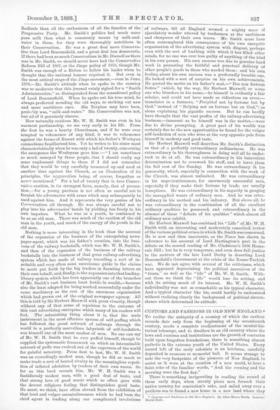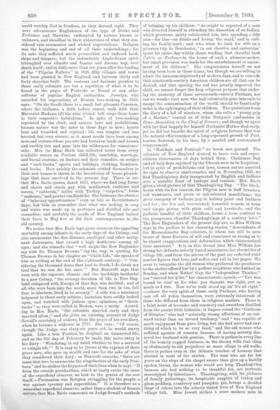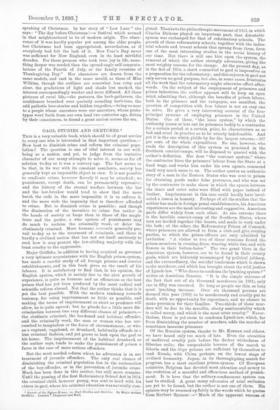CUSTOMS AND FASHIONS IN OLD NEW ENGLAND.* To realise the
antiquity of a country of which the earliest records date only from the beginning of the seventeenth century, needs a complete readjustment of the mental-his- torical telescope, and to dwellers in an old country where the laws and customs and institutions are the growth of centuries built upon forgotten foundations, there is something almost pathetic in the extreme youth of the United States. Every record left of the early colonists is an heirloom, carefully deposited in museum or memorial hall. It seems strange to note the very footprints of the pioneers of New England, to assist as it were at the creation of a new world, to hear a faint echo of the familiar words, "And the evening and the morning were the first day."
There is something invigorating in reading the record of these early days, when sternly pious men forsook their native country for conviction's sake, and sailed away over a perilous sea to found a new home in a new land where they
" Customs and Fashions in Old Now England. By Alice Morse Earle. Loudon: David Nutt.
could worship God in freedom, as they deemed right. They were adventurous Englishmen of the type of Drake and Frobisher and Hawkins, undaunted by terrors known or unknown, and steadfast in their abhorrence of what they con- sidered vain ceremonies and wicked superstitions. Religion was the beginning and end of all their undertakings ; for its sake they suffered much persecution and endured hard- ships and dangers; but the indomitable Anglo-Saxon spirit triumphed over climate and famine and disease, nay, over death itself; and in little more than ten years after the landing of the "Pilgrim Fathers" in 1620, fifty villages and towns had been planted in New England, and between thirty and forty churches built. The customs and fashions peculiar to those early colonists are but a repetition of what is to be 'found in the pages of Fosbroke or Brand or any other collector of popular English antiquities. Josselyn, who recorded his impressions of Boston love-making in 1663, says: "On the South there is a small but pleasant Common, where the Gallants, a little before sunset, walk with their Marmalet-Madams till the nine o'clock bell rings them home ' to their respective habitations." In spite of love-making regulated by the clock, and austere laws and prohibitions, -human nature was the same in those days as now ; hearts heat and trembled and rejoiced ; life was simpler and less hurried, but very sincere, as it must needs have been among men and women whose parents had forsaken lands and houses and earthly ties and gone into the wilderness for conscience' sake. Mrs. (or Miss) Earle has collected notes from every available source on Puritan child-life, courtship, marriage, and burial customs, on doctors and their remedies, on recipes and " cook-books," sports and holidays, clothing, furniture, • and books. How quickly the colonists settled themselves in their new homes is shown in the inventories of house-plenish- • ings that have survived to the present day. There is one that Mrs. Earle quotes, dated 1657, where we find long forms and chairs and stools gay with needlework cushions and .covers, " cubberds," tables with Turkey " carpettes," brass -" andirons," and pewter candlesticks. She bemoans the absence of " balneary appurtenances" even as late as Revolutionary days, but bids us remember that what was lacking in soap and water was made up in perfumes and distilled oils and cosmetics; and probably the maids of New England bathed their faces in May dew as did their contemporaries in the old country.
We notice that Mrs. Earle lays great stress on the appalling mortality among infants in the early days of the Colony, and also enumerates the dire diseases, small-pox' and other malig- nant distempers, that caused a high death-rate among all ages ; and she remarks that "well might the New Englander say with Sir Thomas Browne" (by the way, in quoting Sir Thomas Browne in her chapter on "Child-Life," she speaks of • him as writing at the end of the eighteenth century) : "'Con- sidering the thousand doors that lead to death, I do thank my God that we can die but once." But Bancroft says that • even with the vigorous climate and the hardships incidental to a new Colony, "the average duration of life in New Eng- land compared with Europe of that day, was doubled; and of all who were born into the world, more than two in ten, full four in nineteen, lived to be seventy." A wife was a necessary • helpmeet to those early settlers ; bachelors were coldly looked upon, and watched with jealous eyes ; spinsters, or " thorn- backs " as they were called in Boston, were a rarity. Accord- 4ng to Mrs. Earle, "the colonists married early and they married often ;" and she gives an amusing account of Judge .Sewall's courtship of widows, from the pages of his own diary, when he became a widower in 1717. She says : "Of course, though the Judge was sixty-six years old, be would marry .again. Like a true Puritan, he despised an unmarried life, • and on the 6th day of February he made this naive entry in his diary : Wandering in my mind whether to live a married • or a single life." It is easy to be jocose at the expense of these grave men, who gave up wealth and ease for the sake of what they considered their duty ; as Bancroft remarks, "there are some that love to enumerate the singularities of the early Puri- -tans," and he strikes the keynote of their lives when he says: "If from the outside peculiarities, which so easily excite the sneer of the superficial observer, we look to the genius of the sect 'itself,—Puritanism was Religion struggling for the people, a war against tyranny and superstition." It is therefore as a somewhat superficial observer, rather than a student of human %nature, that Mrs. Earle comments on Judge Sewall' s methods of bringing up his children : " As might be expected of a man who diverted himself in attending the dissection of an Indian, which gruesome gaiety exhilarated him into spending a tidy sum—for him—on drinks and feeing ' the maid,' and in visit- ing his family tomb ; and who, when he took his wife on a pleasure trip to Dorchester, to eat cherries and rasberries,' spent his entire day within doors reading that cheerful book Calvin on Psalms,—in the house of such a pleasure-seeker, but small provision was made for the entertainment or amuse- ment of his children." She congratulates herself on not having been born in those times ; but though we are willing to admit the immense superiority of modern days, and to concede that nineteenth-century American children are all that can be desired, and that sparing the rod has greatly improved the child, we cannot forget the deep religious purpose that under- lay the austerity of those seventeenth-century Puritans, nor can we wonder that men who had voluntarily gone into exile to escape the contamination of the world, should be fanatically strict in the upbringing of their children. The quotations from the diary of a lad of nineteen, whom she calls a "young prig of a Mather," remind us of John Bunyan's confessions in Grace Abounding in the Chief of Sinners; and though we agree with her that happily for himself Nathaniel Mather died early, yet be did but breathe the spirit of religious fervour that was the natural effervescence of a long-repressed growth of Puri- tanism, fostered, in his case, by a morbid and overstrained temperament.
In "Holidays and Festivals" we break new ground. The colonists of New England desired to leave vain and super- stitious observances of days behind them. Christmas Day and all holy days enjoined by the Chureh were to be forgotten ; but in spite of prohibitions and laws, human nature asserted its right to observe anniversaries, and in November, 1621, we find Thanksgiving duly inaugurated by English and Indians over a sociable feast of turkeys and venison. Mrs. Earle gives a vivid picture of that Thanksgiving Day. "The block- house with its few cannon, the Pilgrim men in buff breeches, red waistcoats, and green or sad-coloured mandillions; the great company of Indians, gay in holiday paint and feathers and fur ; the few sad, overworked, homesick women, in worn and simple gowns, with plain coifs and kerchiefs ; and the pathetic handful of little children, forms a keen contrast to the prosperous, cheerful Thanksgivings of a century later." The New Englanders of the present day are as Miss Wilkins says in the preface to her charming stories, "descendants of the Massachusetts Bay colonists, in whom can still be seen traces of those features of will and conscience so strong as to be almost exaggerations and deformities, which characterised their ancestors." It is on this thread that Miss Wilkins has strung her delicate, soberly tinted miniatures, her chronicles of village life, and from the mirror of the past are reflected quiet sombre figures that love, and suffer, and toil in her pages. We seem to recognise the old woman who preferred the poorhouse to the shelter offered her by a godless neighbour who knitted on Sunday, and when Esther Gay, the "Independent Thinker," has "carried her p'int," her characteristic speech,—" You was bound to stan' up for what you thought was right, jest as much as I was. Now we've both stood up, an' it's all right," —echoes the very spirit of those early Puritans, who having cast off all yokes themselves, were extremely intolerant of those who differed from them in religious matters. There is a faint scent of lavender and rosemary and sweetfern distilled from the quaint little histories; it lingers round the "Gatherer of Simples," who had "naturally strong affections of an out- ward rather than an inward tendency," and "was capable of much enjoyment from pure living, but she had never had any- thing of which to be so very fond," and the old woman who suffered agonies of remorse because of having secretly doc- tored her husband with gentian. There is pathos in every line of the homely rugged features, in the strong wills that cling as obstinately to old prejudices as moss clings to old walls; there is pathos even in the delicate touches of humour that abound in most of the stories. The man who sat for ten years on the steps of his chapel sooner than give up a hastily spoken threat, the woman who would not keep Thanksgiving because she had nothing to be thankful for, are portraits stereotyped by inheritance. Thanksgiving, with its pictures of family gatherings, its hospitable supplies of turkey and plum-pudding, cranberry and pumpkin pie, brings a decided tinge of colour into the soberly tinted lives of New England village folk. Miss Jewett strikes a more .modern note in speaking of Christmas. In her story of "Law Lane" she says : "The day before Christmas festival which seemed in that neighbourhood to be of modern origin. The obser- vance of it was hardly popular yet among the elder people. but Christmas had been appropriated, nevertheless, as if everybody had felt the lack of it. New Year's Day never was sufficient for New England, even in its least mirthful decades. For those persons who took true joy in life, some- thing deeper was needed than the spread-eagle self-congratu- lations of the Fourth of July, or the family reunions of Thanksgiving Day." Her characters are drawn from the -same models, and cast in the same mould, as those of Miss Wilkins, though the outlines are somewhat less crisp and -clear, the gradations of light and shade less marked, the interest correspondingly weaker and more diffused. All these pictures of rural life,—the pastures, the herb-gatherers, the confidences breathed over quaintly sounding herb-teas, the odd pathetic love-stories and hidden tragedies,—bring us near to a people whose ancestors were our ancestors, whose proto- types went forth from our own land two centuries ago, driven ty their consciences, to found a great nation across the sea.








































 Previous page
Previous page